Helping, healing and fighting: researchers have become refugees, soldiers and activists in the face of a horrifying conflict
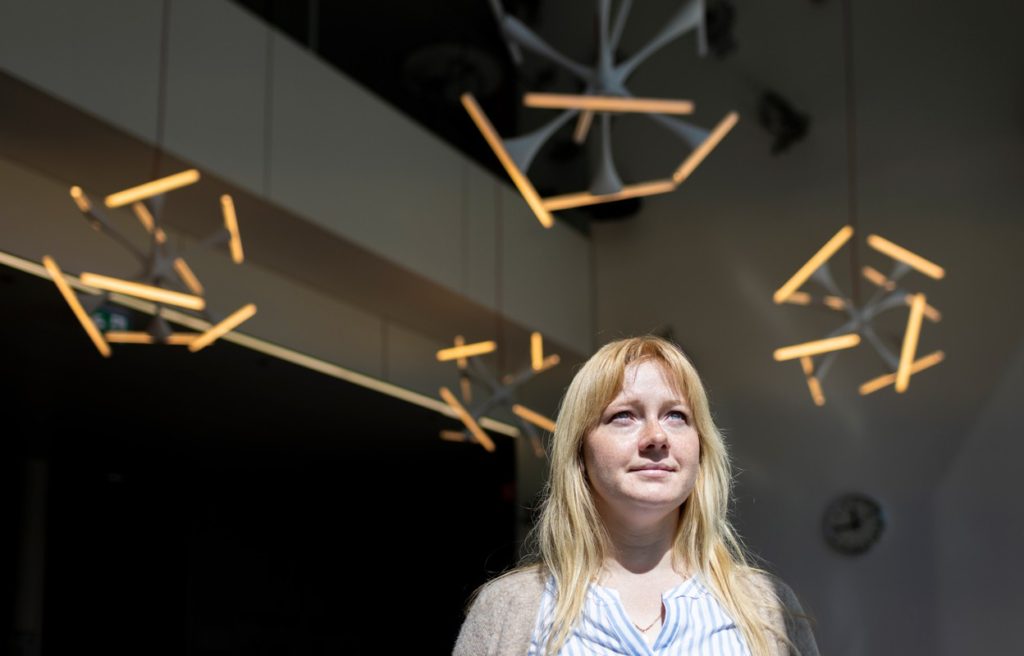
ABOVE: Ukrainian plasma physicist Olena Prysiazhna is now in the Netherlands and is talking to Dutch scientists about continuing her research
25 May 2022 – Olena Prysiazhna fled Russia’s invasion twice. On 25 February, the 35-year-old plasma physicist raced out of Kyiv to her home village 80 kilometres away, hoping to escape the coming attacks on Ukraine’s capital city. Two weeks later, Russian shells began raining down on the previously peaceful village. A rocket exploded in her neighbour’s back garden.
“It broke our windows, doors, roof, but no one was hurt, thank God,” says Prysiazhna. “After that, there were several attacks and we had to act.”
Prysiazhna knew it was time to get out of Ukraine. With her sister Oksana, her mother and her German shepherd puppy Tokay, she set out to leave. After several days traversing the country, they walked across the border to Poland with no clear plan as to where they were going.
In the 10 weeks since the Russian invasion, an estimated 3,100 civilians have died in Ukraine and more than 5 million Ukrainians have fled the country — creating Europe’s biggest refugee crisis in a generation. The war will indelibly alter the lives of tens of millions of Ukrainian people at home and abroad.
Among them are the country’s estimated 95,000 researchers. Until now, they were part of a modernizing scientific system that was beginning to throw off its Soviet-era shackles and integrate more closely with European research. Six months ago, there was a lot of interest in Ukraine and young people were heading up research departments, says George Gamota, a Ukrainian-born US physicist who left in 1944 and helped Ukraine to develop its scientific system after it gained independence in 1991. Now, the war has destroyed science centres in cities such as Kharkiv, Sumy and Mariupol and “a complete reconstruction will be needed once the war ends”, says Gamota.
It is not yet possible to say how many researchers are casualties or have fled the war, although Gamota suggests that some 22,000 — mainly women with children — have left. Scientists worldwide have stepped up to help their colleagues through grassroots efforts such as #ScienceForUkraine, which has collated thousands of job offers at labs worldwide for Ukrainian researchers in need. Governments, universities and organizations such as CARA, the Council for At-Risk Academics in London, are also helping refugee scientists to resettle.
“There’s a lot of pressure in universities from academics and students” across the world, says Stephen Wordsworth, CARA’s executive director. “There’s a great awareness that there are people like them in other countries that are under considerable threat.” CARA is currently helping to place around 100 Ukrainian academics in research positions, mostly in the United Kingdom. “Many of them are optimistic in the circumstances. They’re thinking in terms of, ‘Maybe in six months’ time I’ll be able to go home again’,” he says.
And, in many cases, research and university teaching is continuing where possible at Ukrainian institutions, led by scientists who have remained at home or by refugee researchers who continue their work from overseas. “There’s quite a lot of work being done to keep universities functioning,” says Wordsworth.
Nature spoke to three Ukrainian researchers whose lives have been upended by Russia’s brutal invasion. Here are their stories:
‘I wanted to return power to my hands’
Olena Prysiazhna, plasma physicist, fled Ukraine for the Netherlands
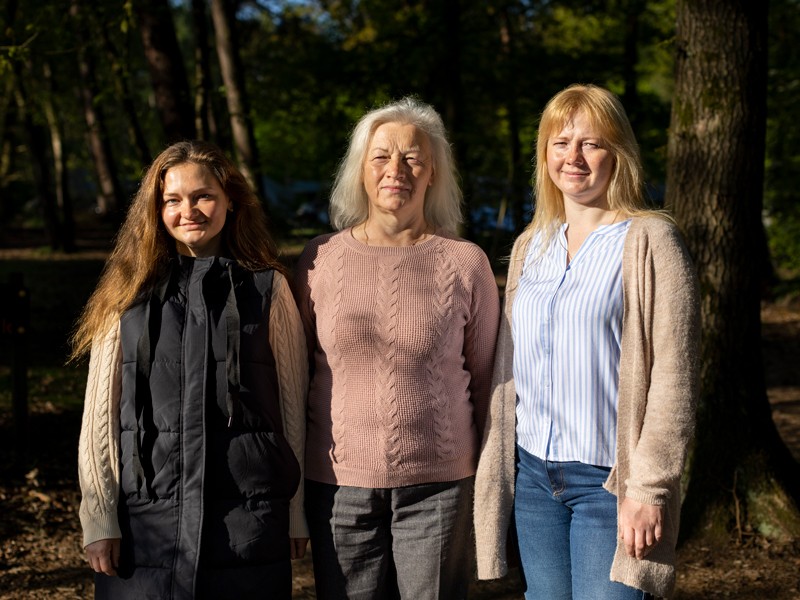
ABOVE: Plasma physicist Olena Prysiazhna (right) with her mother and sister.
When the Russian invasion started, Prysiazhna didn’t think it would last. “We didn’t want to believe that this was happening. We always thought, ‘It’s going to be one or two weeks and this madness will be over’,” says Prysiazhna, who works at Taras Shevchenko National University of Kyiv.
Leaving their village, where her family had spent most of their lives, was difficult — emotionally and logistically. “We didn’t have a plan,” she says. “It’s an unusual feeling, when you don’t know where to go or what to do. Usually you have control of your life, but in war, you lose control of your life no matter what you do.”
Without access to a car, after about a week travelling inside the country, they found a driver who helped them get to the Polish border. They walked across and were helped by volunteers and taken to a refugee centre. From there, they took the next bus — regardless of destination — that would allow their dog on board. (“He’s part of our family,” says Prysiazhna. “We couldn’t leave him behind.”)
They ended up in the Netherlands on 16 March. The first days were hard, says Prysiazhna. The trauma of war completely drained their energy, and she and her family initially managed only essential tasks, such as walking the dog. But after a while, Prysiazhna wanted to do something useful. “I wanted to return power to my hands.”
‘I will do anything to help Ukrainian scientists’
Taras Oleksyk, genomics researcher in Michigan, assisting people from Ukraine
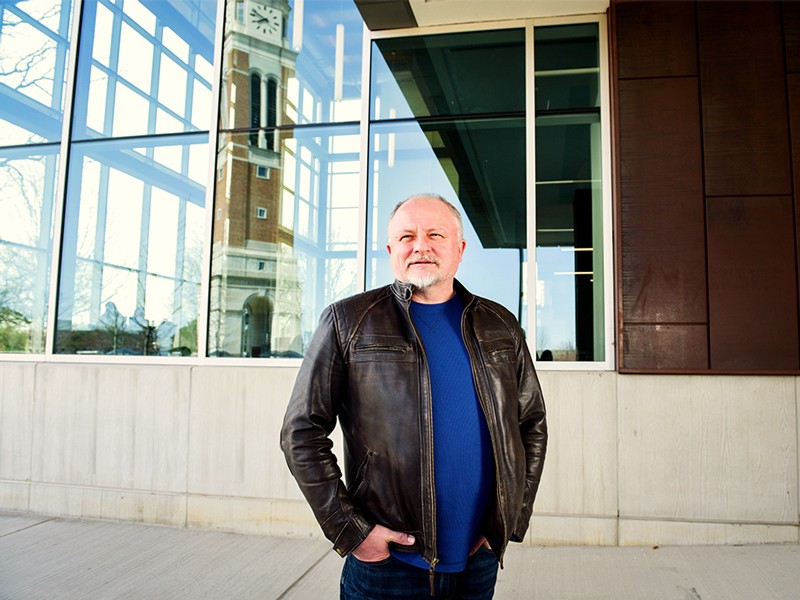
ABOVE: Taras Oleksyk was born in Ukraine and heads a genomics lab at Oakland University in Michigan
This year, Taras Oleksyk is hoping to welcome to his laboratory a person with an unusual CV. Valerii Pokrytiuk, a young data engineer, has been accepted to do a master’s in bioinformatics at Oleksyk’s lab at Oakland University in Rochester, Michigan. But first, Pokrytiuk will serve his nation on the front line as a medic in the Ukrainian army.
Pokrytiuk won’t be the only Ukrainian in the lab. Oleksyk was born in the country and left in 1992 to finish graduate school in the United States. A genomics researcher, he has since the early 2010s spearheaded an effort to chart the genome diversity of Russia and Ukraine, which he calls a “desert” in population genetics. (Tensions between the two nations have doomed that project, says Oleksyk, leading him to create a new one focusing on Ukrainian genomics.) But since Russia invaded his country of birth on 24 February, Oleksyk has devoted his work and personal life to a different purpose: helping Ukrainian researchers in any way he can.
When the war broke out, the first challenge was assisting one of his graduate students, Khrystyna Shchubelka, to get out of Ukraine, where she was organizing a genomics collaboration with a lab there. Shchubelka, who is Ukrainian, had also taken her baby to visit relatives. Her flights were cancelled and she had to walk across the border to Slovakia, says Oleksyk, who helped to raise money for flights to get her back to the United States.
He then began organizing assistance from Michigan with his wife, Audrey Majeske, who is also a biologist at Oakland. They set up an information table at the university where people could ask questions about the war, held a candlelight vigil, raised money for Ukrainian aid and hosted refugees at home. Oleksyk, who has a joint faculty appointment at Uzhhorod National University in western Ukraine, also teaches an online weekly university genomics course to 12 or so students in Ukraine, and the course material is shared with about 100 people. Sometimes the lectures are cancelled because of air raids, but “people log in from basements. They’re interested in genomics”, he says. “I am humbled by the defiance of Ukrainian students that keep coming to class in the time of war.”
Now, Oleksyk’s focus is on trying to find jobs or university places for Ukrainian researchers and students who have arrived in the United States. In addition to organizing a funded position in his lab for Pokrytiuk, he has secured a place for another Ukrainian refugee to begin graduate studies in biology, and is trying to convince the university to waive tuition fees for undergraduate students from the country. “I will do anything possible to provide opportunities to Ukrainian scientists,” he says.
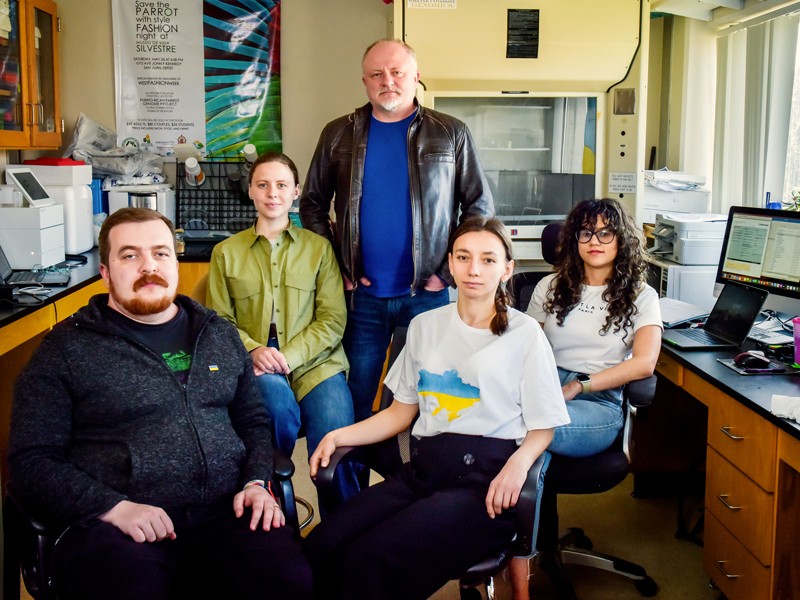
ABOVE: Students from Ukraine and Puerto Rico with genomics researcher Taras Oleksyk (standing) in his lab.
In Oleksyk’s lab, scientists from Ukraine will have a taste of the familiar. The lab has three Ukrainian graduate students, and nearby Detroit has one of the United States’ biggest Ukrainian communities. Oleksyk, too, knows how it feels to be displaced. He established his lab at Oakland after he left Puerto Rico in 2018 following its devastation by Hurricane Maria. He brought his graduate students from the island. “My lab is referred to as ‘The Ukaricans’,” says Oleksyk.
The work has been intense. “My wife says sometimes I spend a little too much time, but this is constantly on our minds.” And his situation, he says, doesn’t compare to that of his family in the Zakarpattia oblast of western Ukraine. He and his sister opened their house to displaced compatriots — each room now has a family living in it, some 25 people in all. And his sister, an endocrinologist, is employing as many people with medical training as she can in her clinic there. “Right now, I’m dealing with survivor’s guilt. Whatever I’m doing, it’s never enough.”
Despite the horrors of the war, Oleksyk can see a sliver of hope for research. “Maybe this is a great opportunity to shake off that Soviet baggage and move on,” he says. When the war is over, Ukraine can finally integrate into the international community and “we can do the great things, including science”, says Oleksyk. “I know Ukraine is going to win this. I know Ukrainian people, they’re stubborn as hell.”
‘We must protect our ability to work as scientists’
Valerii Pokrytiuk, bionformatician, an enlisted medic in the Ukrainian army
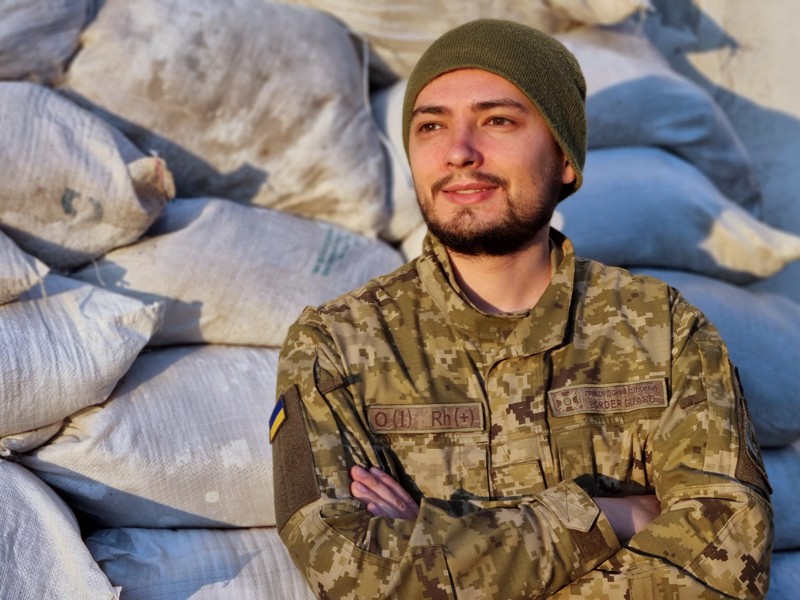
ABOVE: Valerii Pokrytiuk is a front-line medic who plans to do a master’s in bioinformatics after the war.
In his small amount of free time, Valerii Pokrytiuk is doing a bioinformatics course online, and writing code on his smartphone. It’s not as easy as doing it on a laptop, he says, but he’s keen to learn computational biology.
Before the invasion, the 26-year-old was working as a data engineer for Emedgene, part of the US genetic-sequencing firm Illumina. When he spoke to Nature in early April, he was hours away from deploying to the front line as a medic in the Ukrainian army. Like many of his fellow citizens, he volunteered to fight for his nation on the first day of Russia’s invasion. A few weeks later, Pokrytiuk, who has a degree in medicine, was called up and placed in a border-guard unit of the Ukrainian army. After three weeks of basic training, which included general tactics, shooting and tactical combat casualty care — a crash course in combat medicine — Pokrytiuk left for the front, although he could not reveal the location. “We are the first line of defence,” he says.
The decision to enlist wasn’t difficult for Pokrytiuk, who was living and working in his university town of Vinnytsia in central Ukraine when the war started. “There are times to create science and there are other times to protect science and our ability to work as scientists,” says Pokrytiuk. “Today is the other kind of time,” he says. “I do like my science and coding routine more, but there was no choice for me, it was really simple.”
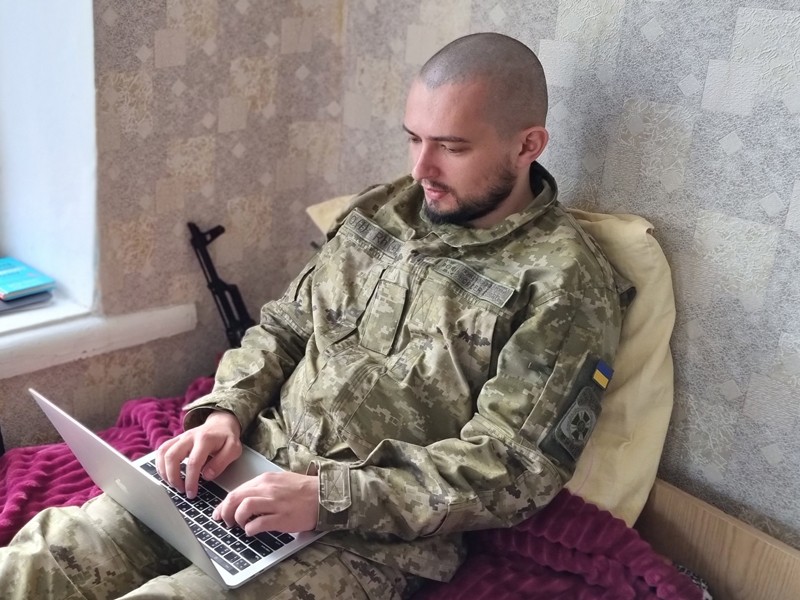
ABOVE: Valerii Pokrytiuk is doing an online course in bioinformatics in his small amount of free time.
Pokrytiuk knows that he won’t be home in days or weeks. But he hopes it won’t be years before the war ends. He has plans to go to the United States to get a master’s degree in bioinformatics at Oakland University, working in Oleksyk’s lab. Ultimately, he says, he wants to use computing and genomics research to save and prolong lives.
For now, Pokrytiuk shows little fear in the face of conflict. “I definitely don’t want to lose my arms, because I’m a big fan of paragliding,” he says. He has been more scared to think of what has happened in the besieged cities of Bucha, Irpin and Mariupol, which have seen intense fighting between Ukrainian and Russian forces and evidence of atrocities committed by Russian troops. Pokrytiuk’s friends fought in some of those cities, and his relatives are in the military or have fled from occupied areas. “It’s a personal story for me.”
His immediate family, he says, is safe and his grandfather has refused to leave his home in northern Ukraine. “We joked a lot that my grandfather believes in the armed forces more than the Pope believes in God.”
Now Pokrytiuk is one of the people defending his grandfather and the rest of Ukraine. “I’m not scared,” he says. “We know what we’re fighting fOR”.